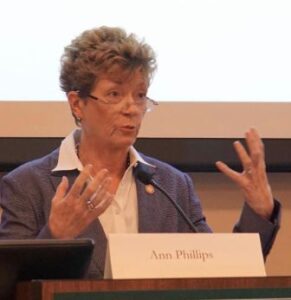
Why aren’t Virginia localities acting more aggressively to protect themselves from rising sea levels? You don’t have to believe in catastrophic global warming to acknowledge that sea levels are creeping steadily higher worldwide or that subsidence caused by shifting tectonic plates and shrinking aquifers is aggravating flooding in Virginia’s Tidewater.
A big reason for the complacency, says Navy Adm. Ann Phillips, is that people think someone will bail them out. Virginia’s coastal-adaptation czar, appointed by Governor Ralph Northam, drove home the point last month at a College of William & Mary forum. Reports the Free Lance-Star:
“As I talked to people about what options are, in passing, to deal with the future, I have a sense that many homeowners feel that the cities are going to bail them out. And that the cities feel that the states should bail them out, and that the state thinks the federal government should bail them out.”
The United States — and Virginia is no exception — suffers from systemic moral hazard. When something bad happens, the politicians and the media lead an outcry for government to step in. After enough bail-outs, the public develops an entitlement expectation that government will step in. And, when people expect to be bailed out from the consequences of poor decisions, they are more likely to build where they shouldn’t.
Phillips argues that the expectation is misplaced. “In actuality, none of that is going to happen,” she says.
So far, the General Assembly has not stepped up to the challenge. One example, legislators have yet to appropriate money to a fund they established in 2016 to create a low-interest loan program to help residents and businesses subject to recurrent flooding. Phillips herself has no funding for staff.
Also breathing down the neck of Phillips and the General Assembly, maintaining Virginia’s Triple A credit rating while generating big bills to protect and make communities more resilient to climate change.
There are signs in Norfolk and Virginia Beach that local governments are thinking differently about climate change. Whether they’re doing enough, however, is an open question. Here are some of the things we should be doing:
- At the top of the list, stop subsidizing insurance that pays for re-building in flood-prone zones. Put this at the top of the list. It costs taxpayers nothing. Indeed, it saves taxpayers money. Ending subsidies should be the easiest thing politically to accomplish.
- Stop expanding public infrastructure (roads, water, sewer, etc.) to serve development in flood-prone zones. If developers want to build and maintain infrastructure in vulnerable areas, fine, let them, but don’t put the onus on taxpayers.
- Create special tax districts in areas of high-value development that can sell bonds to pay for local flood-control infrastructure.
- Require Realtors to inform home buyers when properties are located in a flood-prone zone or in an area that is likely to become flood-prone within the next 30 years (the length of a mortgage).
- Allow banks and other mortgage-lenders to charge a risk premium when providing mortgages for properties built in flood-prone areas.
The underlying theme here is that people should be free to build wherever they want. But they are not entitled to low-interest financing, they are not entitled to government-built infrastructure in vulnerable, flood-prone areas, and they are not entitled to bail-outs. These aren’t difficult principles to grasp. I cannot fathom why Virginia has failed to implement them.

Leave a Reply
You must be logged in to post a comment.